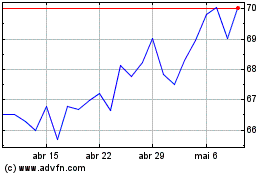UNBC appoints two Research Chairs in partnership with Rio Tinto
15 Janeiro 2025 - 2:23PM
Business Wire
The University of Northern British Columbia and Rio Tinto have
expanded a partnership to advance vital research into the impacts
of climate change on water security and freshwater fishes in the
Nechako Watershed.
This press release features multimedia. View
the full release here:
https://www.businesswire.com/news/home/20250115183770/en/
The $1.75 million in research funding from Rio Tinto will
support two Research Chairs at UNBC for the next five years,
generating regional knowledge critical to the long-term
sustainability of the watershed while informing global water
management and climate resilience efforts.
Environmental Science Professor Dr. Stephen Déry has been named
Rio Tinto Research Chair in Climate Change and Water Security. The
position is a renewal of an initial Industrial Research Chair (IRC)
appointment jointly supported by Rio Tinto and the Natural Sciences
and Engineering Research Council of Canada in 2019. The next phase
of Déry’s research will include expanding the hydrometeorological
monitoring and numerical modeling efforts developed through the
IRC, as well as the development of forecasting systems to predict
river water temperatures along the main stem Nechako River.
“Through the IRC program of research that began in 2019, our
team has worked in collaboration with multiple partners including
Rio Tinto to greatly expand our monitoring and understanding of
climate change and meteorological phenomena such as atmospheric
rivers. This led us to assess their impacts on water security
across the Nechako Watershed in the context of past and potential
future climate change,” says Déry. “Over the next five years we
will continue to closely monitor and investigate climate,
atmospheric and hydrological conditions, processes and phenomena
across the Nechako Watershed as the climate crisis continues to
unfold. This will assist communities, stewardship societies and
industries to better prepare, adapt to and mitigate the impacts of
climate change to ensure future water security across the Nechako
Watershed and beyond.”
Ecosystem Science and Management Associate Professor Dr. Eduardo
Martins has been appointed Rio Tinto Research Chair in Climate
Change and Freshwater Fish Ecology. His research will address
knowledge gaps in how water temperature variability caused by both
natural processes and river regulation influence fish behaviour and
survival.
“The Nechako Watershed is home to numerous fish species –
sockeye salmon, Chinook salmon, rainbow trout, burbot and Nechako
white sturgeon – that are important to the ecosystems as well as
the First Nations and diverse cultures across the region,” says
Martins. “Given their vulnerability to warmer water temperatures,
the observed warming trends and recent extreme temperature events
raise concerns about the long-term sustainability of many
species.”
Working in collaboration with Déry, Martins will develop models
exploring how changes in water temperature and future extreme
events will impact freshwater fish populations in the watershed,
informing critical fisheries management on keystone (salmon) and
endangered (Nechako white sturgeon) aquatic species, as well as
conservation policies and practices in the region.
Findings from these research projects will help to support Rio
Tinto’s operations in the watershed while providing guidance on the
release of ecological flows at the Skins Lake Spillway.
“Climate change is having a significant impact on the Nechako
Watershed, which plays a vital role in our hydroelectric
operations, First Nations cultural practices and the quality of
life of local communities,” says Andrew Czornohalan, Director –
Energy & Watershed Partnerships at Rio Tinto BC Works. “The
research work conducted by Dr. Déry and his local team enhances our
collective understanding of meteorological phenomena and their
consequences on the environment. The expanded scope of our
partnership with UNBC will provide additional scientific data to
inform our collaborative approach to reservoir management and
improving the river.”
This renewed partnership will sustain active outreach and
engagement across the region as the UNBC Research Chairs and
members of their teams work with local First Nations and a range of
partners and community groups.
“This partnership illustrates the transformative power of
collaboration as we work together to find local solutions for
global issues,” says UNBC Vice-President, Research and Innovation
Dr. Paula Wood-Adams. “Grand challenges such as climate change
cannot be addressed in isolation. Diverse teams and partnerships
are essential, including community members who live and work in the
region and private enterprise along with our academic
researchers.”
In addition to the funding from Rio Tinto, UNBC will provide
cash and in-kind contributions totalling approximately $1.3 million
over the course of the five-year program, helping to support a team
of 11 researchers, including master’s students, PhD candidates and
post-doctoral fellows.
Backgrounder
Rio Tinto Research Chair in Climate Change and Water
Security
The overarching objective of this research program is to better
understand and quantify the roles of climate change and
hydrometeorological extremes on long term water security of the
Nechako Watershed.
Three main themes:
- Hydrometeorological extremes including droughts and atmospheric
rivers
- Microclimates and climate change in the Vanderhoof agricultural
belt
- Variability and predictability of water temperatures
Research on these themes will span from the headwaters of the
Nechako Watershed to the Nechako River’s confluence with the Fraser
River in Prince George.
Rio Tinto Research Chair in Climate Change and Freshwater
Fish Ecology
The overarching objective of this research program is to focus
on how spatial and temporal variability in water temperature –
caused by natural processes, land use, wildfires and river
regulation – influence fish behaviour and survival.
Two main themes:
- Thermal preference and behavioural thermoregulation
- Thermal tolerance
The research program will be developed by collecting data using
telemetry, data logging, thermal imagery and lab-based experiments
on thermal preference and tolerance.
An overview of Dr. Stephen Déry’s IRC research is available
here: https://www.youtube.com/watch?v=2D__otHvfeg
About Rio Tinto in British Columbia
Rio Tinto celebrated the 70th anniversary of its operations in
British Columbia in June 2024. With industry leading technology and
four generations of employee expertise, as well as a clean
hydropower facility at Kemano and the Nechako Reservoir, the
Kitimat smelter produces aluminium with one of the lowest carbon
footprints worldwide.
View source
version on businesswire.com: https://www.businesswire.com/news/home/20250115183770/en/
Rio Tinto Media Relations
Malika Cherry M +1 418 592 7293
malika.cherry@riotinto.com
UNBC Communications Officer
Michelle Cyr-Whiting M +1 250-960-5402
michelle.cyr-whiting@unbc.ca
Category: BC Works
Rio Tinto (NYSE:RIO)
Gráfico Histórico do Ativo
De Dez 2024 até Jan 2025

Rio Tinto (NYSE:RIO)
Gráfico Histórico do Ativo
De Jan 2024 até Jan 2025
